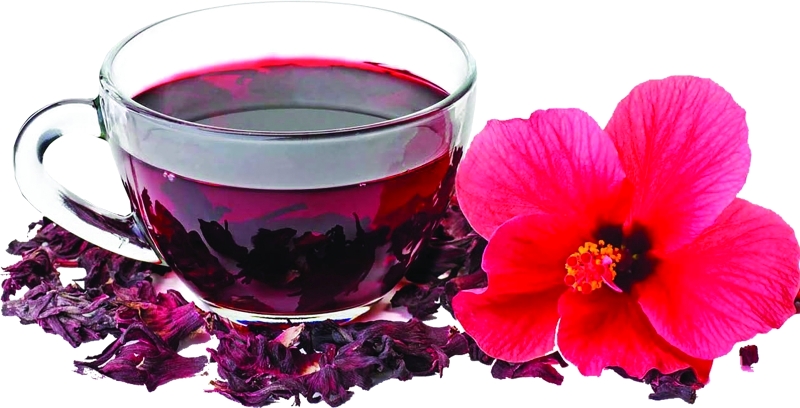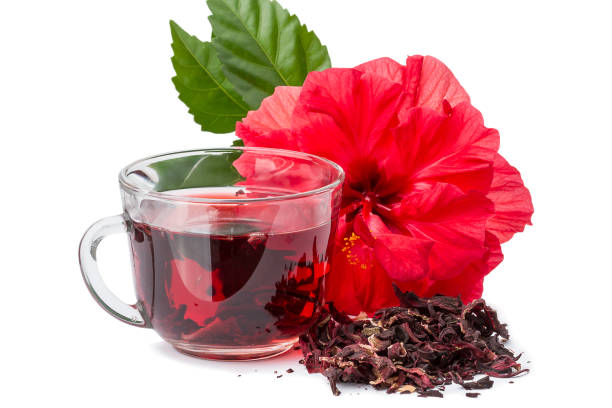Hibiscus is one of the most famous and important herbal plants due to its use in many traditional remedies and folk medicines. But according to the health website Boldsky, getting the best benefit from herbs depends on the appropriate dose and method of preparation in order to minimize any possible side effects.
Hibiscus can be used in several ways depending on the type of disease. The most common forms of hibiscus are hibiscus tea made from its flowers and leaves, hibiscus oil, hibiscus paste and hibiscus powder. Hibiscus can also be turned into jams, sauces or soups and used as cooking ingredients
Health benefits of hibiscus:

1 Diabetes
According to a scientific study, Rosa sinensis hibiscus has an anti-diabetic effect and can help reduce blood glucose in both healthy adults and people with diabetes.
Another study says that hibiscus can inhibit the absorption of carbohydrates in the intestines and, therefore, can help reduce glucose spikes after meals.
2 Pregnant women with diabetes
Pregnant women with diabetes may have to face some additional challenges during pregnancy. Complications include birth weight gain, premature birth, and stillbirth of newborns.
A study showed that hibiscus can cause positive effects on pregnant women with diabetes and their offspring because it is rich in phenolic compounds and flavonoids.
3 Slows the progression of breast cancer
The results of a scientific study revealed that hibiscus extract, when combined with chemotherapy, can specifically stimulate the elimination of breast cancer cells and prevent its progression. Hibiscus can also help reduce chemotherapy doses and related toxicity during treatment by reducing oxidative stress.
4 Treats high blood pressure
One study suggests that Hibiscus sabdariffa L. hibiscus flower has a low degree of toxicity and its decoction is used in many countries around the world to lower blood pressure. Daily consumption of hibiscus can help lower systolic and diastolic blood pressure in people with mild to moderate hypertension.
The study showed that the anthocyanin pigment, which gives the hibiscus flower its distinctive color, is generally responsible for the hypotensive activity.
5 Treats cold
Hibiscus contains some phenolic acids such as ascorbic, malic, citric and hydroxycitric acid.
These acids confer powerful anti-inflammatory and antioxidant effects against a range of diseases, including cold, cough and flu.
Hibiscus can help immediately relieve coughs and colds when consumed as a tea. It can also serve as a great tonic to resist sore throat and mild headaches.
6 Prevention of skin cancer
A study showed that hibiscus can help prevent the growth of skin cancer cells, because it contains polyphenols, which are useful for preventing cancer cells and stopping their growth in skin cancer patients.
7 Good for the heart
Hibiscus helps in the treatment of various heart diseases such as high blood pressure and high cholesterol and thus maintains heart health.
The Benefits Of Hibiscus For Skin
Hibiscus, especially its leaves, acts as an excellent skin cleanser. Rubbing hibiscus leaves on the face and neck can help remove dead skin cells, blackheads or whiteheads and make the skin smooth and smooth.
The anti-inflammatory properties of hibiscus also help treat skin problems such as acne and dry skin. Hibiscus can also help slow aging caused by harmful UV rays by increasing collagen production and decreasing melanin synthesis. Read more about Benefits Of Fenugreek.
The Benefits Of Hibiscus For Hair
Studies show that a paste made from ground hibiscus leaves and petals can be used for hair. Hibiscus is known to be used to get a dark hair color and reduce dandruff when used after shampoo.
Besides reducing hair loss, hibiscus can also help prevent premature graying.
